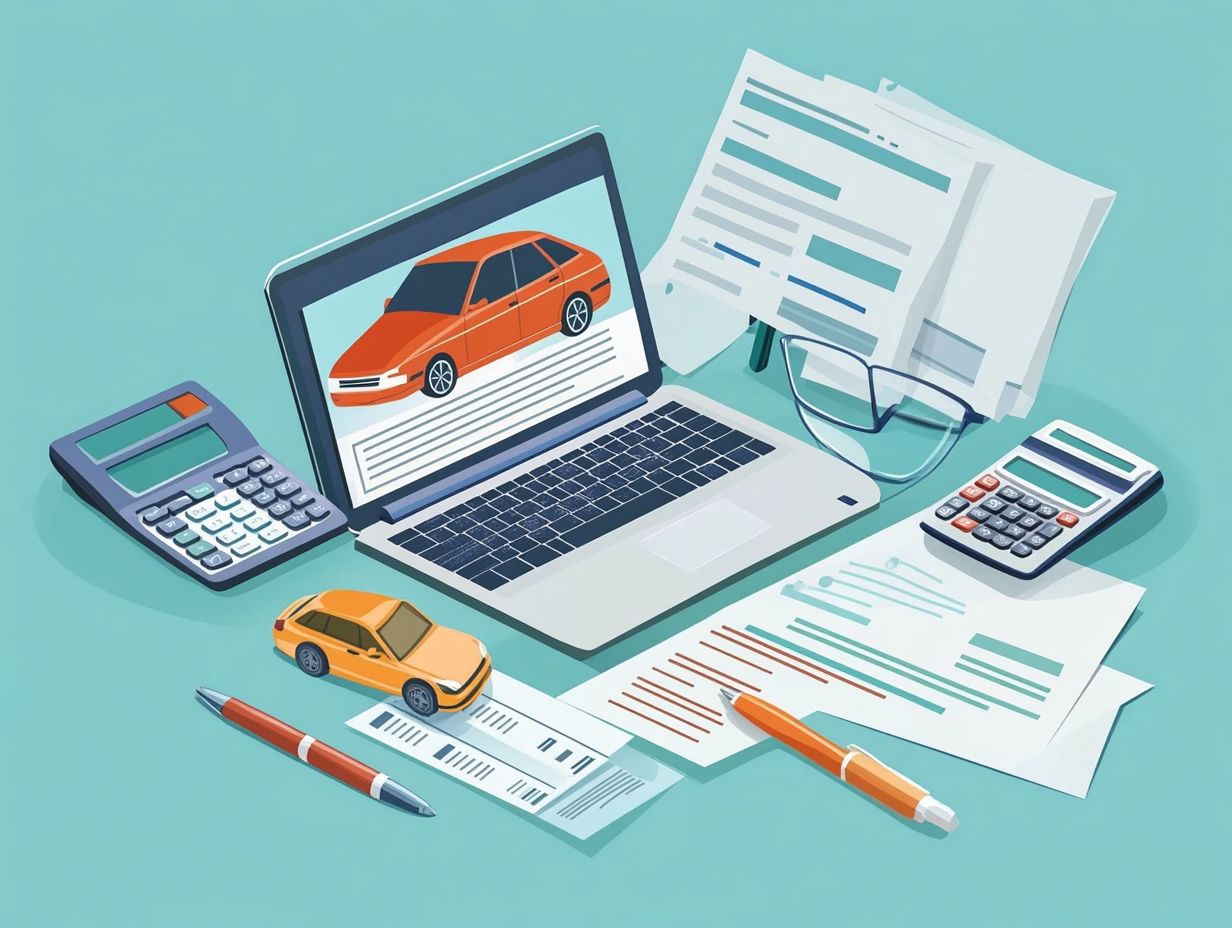What You Need for a Car Loan Application
Considering a car purchase? Grasping the intricacies of car loans is vital for making informed decisions that truly reflect your financial landscape.
This article will take you through the fundamentals of car loans what they are, how they operate, and how to prepare for your application.
You will explore key elements to keep in mind, such as interest rates and credit scores, while also receiving valuable tips for crafting a successful application.
Get ready to tackle car loans with confidence!
Contents
Key Takeaways:

Before applying for a car loan, assess your finances and gather necessary documents to ensure a smooth application process.
Consider factors such as interest rates and loan terms, as well as the impact on your credit score, before applying for a car loan.
To increase your chances of success, work on improving your credit score and negotiate terms during the car loan application process.
Understanding Car Loans
Grasping the intricacies of car loans is vital for making informed financial choices when you are in the market for a vehicle.
A car loan is a specialized credit option tailored for financing your purchase, involving borrowing a sum from a lender that you will need to repay over a designated term, complete with interest.
It is essential to understand the nuances of lender requirements, the terms of the loan, and the different loan options available through various financial institutions.
What is a Car Loan and How Does it Work?
A car loan is essentially a financial agreement where a lender provides the funds you need to purchase a vehicle, expecting you to repay that amount over a specified time with interest.
Securing this type of loan involves a thorough application process, requiring you to submit various documents, including details about the vehicle and proof of your credit history to gauge your financial stability.
It is essential to grasp the nuances of loan terms, which typically range from 36 to 72 months or even longer, depending on the lender’s policies.
The importance of providing accurate vehicle information, such as make, model, year, and condition, cannot be overstated; this data is crucial in determining both the loan amount and the rates you might receive.
Having a solid credit history and a robust financial background can significantly boost your chances of securing approval for your loan. Lenders will carefully assess these factors, fully aware of the potential risks involved, which ultimately influences the terms and interest rates they offer you.
Preparing for a Car Loan Application
Preparing for a car loan application requires a methodical approach to ensure you meet all lender requirements.
Gather proof of income, proof of address, and proof of insurance, along with other relevant details such as employment verification and the vehicle identification number (VIN) for the car you intend to finance.
By organizing these documents ahead of time, you position yourself for a smoother and more successful loan application process.
Assessing Your Finances
Assessing your finances is a crucial step before you dive into applying for a car loan, as it directly impacts your borrowing capacity and the terms you will be offered.
Act now! Check your credit scores to boost your chances! Review your credit history, as it can sway lender decisions.
Verify your income sources to ensure you can comfortably handle those monthly payments.
Calculating your budget for monthly payments is essential. Don t just consider the loan amount; factor in interest rates, insurance, and maintenance costs as well.
Understanding these elements provides you with a clearer picture of what you can truly afford without stretching your finances too thin.
Being aware of your financial history is key, as lenders scrutinize applicants based on their past behaviors, influencing the options available to you.
Having a solid grasp of these factors will empower you to make informed decisions, significantly increasing your chances of securing favorable loan terms.
Gathering Necessary Documents

Gathering the necessary documents is needed for a smooth car loan application. Lenders require specific information to determine your eligibility.
Key documents you should prepare include:
- Proof of income
- Proof of address
- Details about the vehicle, such as its make and model
You may also need to provide additional loan documents if requested during the application. Lenders often ask for your bank statements to check your financial stability and existing obligations. This helps them assess your ability to repay more effectively.
If applicable, include documentation related to rental property income. This can enhance your financial profile by showcasing additional revenue streams that could improve your chances of approval.
Don’t miss out on crucial documentation gather everything you need to boost your chances of approval! Insurance documentation is also important, as lenders need to confirm that the vehicle will be adequately insured once purchased.
Collectively, these documents offer a comprehensive overview of your financial health and play a crucial role in the lender’s decision-making process.
Factors to Consider Before Applying
Before diving into your car loan application, take a moment to consider these important factors that can greatly impact your financial choices and overall satisfaction.
Consider interest rates and loan terms from various lenders, as well as your credit score. These elements will significantly affect the loan amounts for which you may qualify.
Interest Rates and Loan Terms
Interest rates and loan terms are crucial elements of car loans that can significantly impact your financial responsibilities. Auto loan rates can vary dramatically based on lender requirements, your credit score, and market conditions. Understand how these factors affect your loan cost.
When assessing interest rates, consider the difference between fixed and variable rates. Fixed rates provide predictability since your monthly payments remain constant throughout the loan term, allowing for effective budgeting. Variable rates, however, can change with market conditions, which might mean lower initial payments but carries the risk of escalating costs later.
The length of the loan is also critical. While longer terms may lead to smaller monthly payments, they can accumulate more interest over time, ultimately increasing the total amount you repay. Balancing these elements is vital for making informed decisions that support your financial well-being.
Impact on Credit Score
The impact of a car loan on your credit score is pivotal to consider. It can influence your borrowing power in the future.
When you apply for a loan, lenders will conduct credit inquiries that might temporarily lower your credit score. Your payment history on this new loan becomes key in shaping your overall financial history.
How you manage this loan can either enhance or diminish your score over time. Making timely payments shows your reliability, boosting your reputation with creditors. Conversely, missed or late payments can create a negative impression.
To maintain a healthy credit score while navigating a car loan, keep utilization low on your other credit accounts. Also, consider setting up automatic payments to avoid late fees.
Regularly reviewing your credit report allows you to quickly spot and address any inaccuracies. This preserves the integrity of your score and opens the door to better financial opportunities.
Applying for a Car Loan
Applying for a car loan requires navigating several essential steps and understanding the intricacies of the loan process to achieve a favorable outcome.
Start by evaluating your lender options consider banks, credit unions, and online financial institutions.
Once you’ve explored your choices, prepare to submit your loan application. Ensure it includes all pertinent details about the vehicle you’re financing.
Steps to Take and What to Expect

When considering a car loan, following these key steps is vital for your success. Set realistic expectations throughout the entire process.
Begin by exploring various lender options to find a financial institution that best meets your needs. Once you identify a suitable lender, carefully gather your loan documents to ensure a smooth application experience. This means collecting all necessary information, including income statements, credit history, and proper identification.
After submitting your application, expect communication from lenders regarding any additional documentation they may need. The review process typically takes a few days to a couple of weeks, depending on the lender s current workload.
During this time, stay prepared for potential approval conditions, such as requiring a co-signer or a larger down payment. By being proactive and responsive to lender inquiries, you can expedite your approval process and secure the most favorable financing terms available.
Tips for a Successful Car Loan Application
To increase your chances of securing a successful car loan application, it’s essential to follow specific strategies that can greatly influence the lender’s evaluation and your financial choices.
One crucial step is to improve your credit score before submitting your application. With a stronger credit profile, you can negotiate better terms and interest rates with lenders, positioning yourself for a more advantageous financial outcome.
Improving Credit Score and Negotiating Terms
Improving your credit score is a smart strategy for securing favorable loan terms when applying for a car loan. By reviewing your credit history and correcting any discrepancies while maintaining a consistent payment history, you can significantly enhance your negotiating power with lenders.
In addition to these essential steps, consider adopting strategies such as:
- Paying down existing debts
- Minimizing the number of credit inquiries
Reducing your credit card balances positively affects your credit utilization ratio and demonstrates responsible financial behavior. Limit the frequency of loan applications to avoid score dips and project an image of stability.
When you show a solid credit score, you gain greater leverage in negotiations with lenders. This allows you to secure more attractive loan offers, including lower interest rates and more flexible repayment terms, ultimately making your borrowing experience much more beneficial.
Frequently Asked Questions
What documents are needed for a car loan application?
To apply for a car loan, you will typically need your driver’s license, proof of income, proof of insurance, and information about the vehicle you want to purchase. It’s also beneficial to understand what to expect during the car loan approval process.
Is a down payment required for a car loan application?

While a down payment is not always necessary, it can improve your chances of getting approved for a car loan and may also lead to a lower monthly payment.
Can I apply for a car loan with bad credit?
Yes, you can still apply for a car loan with bad credit. However, you may face higher interest rates and may need to provide a larger down payment.
How much income do I need to apply for a car loan?
The amount of income needed to apply for a car loan varies depending on the lender and your credit score. Generally, you should have a stable source of income that allows you to comfortably make the monthly payments.
Can I get pre-approved for a car loan?
Yes, many lenders offer pre-approval for car loans. This process involves submitting your information and credit history to the lender, who will then determine the loan amount and interest rate you qualify for.
How long does the car loan application process take?
The car loan application process can take anywhere from a few hours to a few days, depending on the lender and your individual circumstances. It may take longer if additional documentation or information is required.






